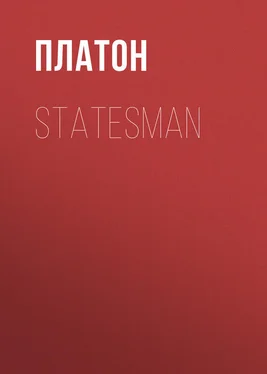Платон - Statesman
Здесь есть возможность читать онлайн «Платон - Statesman» — ознакомительный отрывок электронной книги совершенно бесплатно, а после прочтения отрывка купить полную версию. В некоторых случаях можно слушать аудио, скачать через торрент в формате fb2 и присутствует краткое содержание. Жанр: Философия, foreign_antique, foreign_prose, на английском языке. Описание произведения, (предисловие) а так же отзывы посетителей доступны на портале библиотеки ЛибКат.
- Название:Statesman
- Автор:
- Жанр:
- Год:неизвестен
- ISBN:нет данных
- Рейтинг книги:5 / 5. Голосов: 1
-
Избранное:Добавить в избранное
- Отзывы:
-
Ваша оценка:
- 100
- 1
- 2
- 3
- 4
- 5
Statesman: краткое содержание, описание и аннотация
Предлагаем к чтению аннотацию, описание, краткое содержание или предисловие (зависит от того, что написал сам автор книги «Statesman»). Если вы не нашли необходимую информацию о книге — напишите в комментариях, мы постараемся отыскать её.
Statesman — читать онлайн ознакомительный отрывок
Ниже представлен текст книги, разбитый по страницам. Система сохранения места последней прочитанной страницы, позволяет с удобством читать онлайн бесплатно книгу «Statesman», без необходимости каждый раз заново искать на чём Вы остановились. Поставьте закладку, и сможете в любой момент перейти на страницу, на которой закончили чтение.
Интервал:
Закладка:
I will select the example of weaving, or, more precisely, weaving of wool. In the first place, all possessions are either productive or preventive; of the preventive sort are spells and antidotes, divine and human, and also defences, and defences are either arms or screens, and screens are veils and also shields against heat and cold, and shields against heat and cold are shelters and coverings, and coverings are blankets or garments, and garments are in one piece or have many parts; and of these latter, some are stitched and others are fastened, and of these again some are made of fibres of plants and some of hair, and of these some are cemented with water and earth, and some are fastened with their own material; the latter are called clothes, and are made by the art of clothing, from which the art of weaving differs only in name, as the political differs from the royal science. Thus we have drawn several distinctions, but as yet have not distinguished the weaving of garments from the kindred and co-operative arts. For the first process to which the material is subjected is the opposite of weaving – I mean carding. And the art of carding, and the whole art of the fuller and the mender, are concerned with the treatment and production of clothes, as well as the art of weaving. Again, there are the arts which make the weaver's tools. And if we say that the weaver's art is the greatest and noblest of those which have to do with woollen garments, – this, although true, is not sufficiently distinct; because these other arts require to be first cleared away. Let us proceed, then, by regular steps: – There are causal or principal, and co-operative or subordinate arts. To the causal class belong the arts of washing and mending, of carding and spinning the threads, and the other arts of working in wool; these are chiefly of two kinds, falling under the two great categories of composition and division. Carding is of the latter sort. But our concern is chiefly with that part of the art of wool-working which composes, and of which one kind twists and the other interlaces the threads, whether the firmer texture of the warp or the looser texture of the woof. These are adapted to each other, and the orderly composition of them forms a woollen garment. And the art which presides over these operations is the art of weaving.
But why did we go through this circuitous process, instead of saying at once that weaving is the art of entwining the warp and the woof? In order that our labour may not seem to be lost, I must explain the whole nature of excess and defect. There are two arts of measuring – one is concerned with relative size, and the other has reference to a mean or standard of what is meet. The difference between good and evil is the difference between a mean or measure and excess or defect. All things require to be compared, not only with one another, but with the mean, without which there would be no beauty and no art, whether the art of the statesman or the art of weaving or any other; for all the arts guard against excess or defect, which are real evils. This we must endeavour to show, if the arts are to exist; and the proof of this will be a harder piece of work than the demonstration of the existence of not-being which we proved in our discussion about the Sophist. At present I am content with the indirect proof that the existence of such a standard is necessary to the existence of the arts. The standard or measure, which we are now only applying to the arts, may be some day required with a view to the demonstration of absolute truth.
We may now divide this art of measurement into two parts; placing in the one part all the arts which measure the relative size or number of objects, and in the other all those which depend upon a mean or standard. Many accomplished men say that the art of measurement has to do with all things, but these persons, although in this notion of theirs they may very likely be right, are apt to fail in seeing the differences of classes – they jumble together in one the 'more' and the 'too much,' which are very different things. Whereas the right way is to find the differences of classes, and to comprehend the things which have any affinity under the same class.
I will make one more observation by the way. When a pupil at a school is asked the letters which make up a particular word, is he not asked with a view to his knowing the same letters in all words? And our enquiry about the Statesman in like manner is intended not only to improve our knowledge of politics, but our reasoning powers generally. Still less would any one analyze the nature of weaving for its own sake. There is no difficulty in exhibiting sensible images, but the greatest and noblest truths have no outward form adapted to the eye of sense, and are only revealed in thought. And all that we are now saying is said for the sake of them. I make these remarks, because I want you to get rid of any impression that our discussion about weaving and about the reversal of the universe, and the other discussion about the Sophist and not-being, were tedious and irrelevant. Please to observe that they can only be fairly judged when compared with what is meet; and yet not with what is meet for producing pleasure, nor even meet for making discoveries, but for the great end of developing the dialectical method and sharpening the wits of the auditors. He who censures us, should prove that, if our words had been fewer, they would have been better calculated to make men dialecticians.
And now let us return to our king or statesman, and transfer to him the example of weaving. The royal art has been separated from that of other herdsmen, but not from the causal and co-operative arts which exist in states; these do not admit of dichotomy, and therefore they must be carved neatly, like the limbs of a victim, not into more parts than are necessary. And first (1) we have the large class of instruments, which includes almost everything in the world; from these may be parted off (2) vessels which are framed for the preservation of things, moist or dry, prepared in the fire or out of the fire. The royal or political art has nothing to do with either of these, any more than with the arts of making (3) vehicles, or (4) defences, whether dresses, or arms, or walls, or (5) with the art of making ornaments, whether pictures or other playthings, as they may be fitly called, for they have no serious use. Then (6) there are the arts which furnish gold, silver, wood, bark, and other materials, which should have been put first; these, again, have no concern with the kingly science; any more than the arts (7) which provide food and nourishment for the human body, and which furnish occupation to the husbandman, huntsman, doctor, cook, and the like, but not to the king or statesman. Further, there are small things, such as coins, seals, stamps, which may with a little violence be comprehended in one of the above-mentioned classes. Thus they will embrace every species of property with the exception of animals, – but these have been already included in the art of tending herds. There remains only the class of slaves or ministers, among whom I expect that the real rivals of the king will be discovered. I am not speaking of the veritable slave bought with money, nor of the hireling who lets himself out for service, nor of the trader or merchant, who at best can only lay claim to economical and not to royal science. Nor am I referring to government officials, such as heralds and scribes, for these are only the servants of the rulers, and not the rulers themselves. I admit that there may be something strange in any servants pretending to be masters, but I hardly think that I could have been wrong in supposing that the principal claimants to the throne will be of this class. Let us try once more: There are diviners and priests, who are full of pride and prerogative; these, as the law declares, know how to give acceptable gifts to the gods, and in many parts of Hellas the duty of performing solemn sacrifices is assigned to the chief magistrate, as at Athens to the King Archon. At last, then, we have found a trace of those whom we were seeking. But still they are only servants and ministers.
Читать дальшеИнтервал:
Закладка:
Похожие книги на «Statesman»
Представляем Вашему вниманию похожие книги на «Statesman» списком для выбора. Мы отобрали схожую по названию и смыслу литературу в надежде предоставить читателям больше вариантов отыскать новые, интересные, ещё непрочитанные произведения.
Обсуждение, отзывы о книге «Statesman» и просто собственные мнения читателей. Оставьте ваши комментарии, напишите, что Вы думаете о произведении, его смысле или главных героях. Укажите что конкретно понравилось, а что нет, и почему Вы так считаете.










